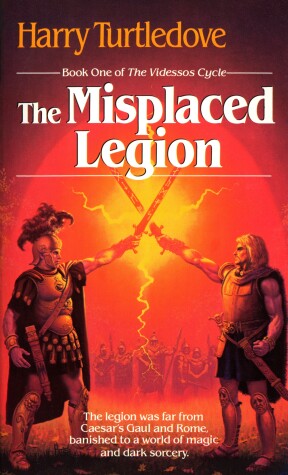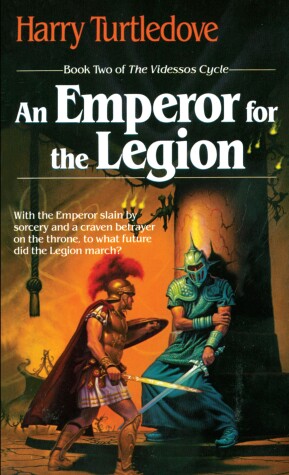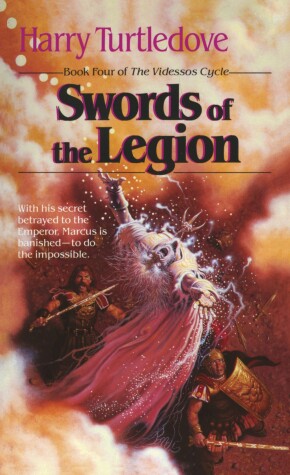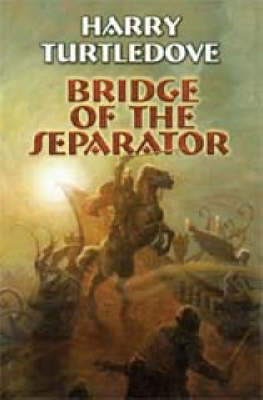Videssos
4 primary works • 5 total works
Book 1
The legion was far from Caesar’s Gaul and Rome, banished to a world of magic and dark sorcery.
Book One of The Videssos Cycle
As they faced one another in a duel of survival, the Roman tribune Marcus Scaurus held the spell-scribed sword of a Druid priest, and the Celtic chieftain Viridovix held a similar sword, bespelled by a rival Druid sorcerer. At the moment they touched, the two found themselves under a strange night sky where no stars were familiar and where Gaul and Rome were unknown. They were in an outpost of the embattled Empire of Videssos—in a world where magic and dark sorcery would test their skill and courage as no Roman legion had ever been tested before.
Book One of The Videssos Cycle
As they faced one another in a duel of survival, the Roman tribune Marcus Scaurus held the spell-scribed sword of a Druid priest, and the Celtic chieftain Viridovix held a similar sword, bespelled by a rival Druid sorcerer. At the moment they touched, the two found themselves under a strange night sky where no stars were familiar and where Gaul and Rome were unknown. They were in an outpost of the embattled Empire of Videssos—in a world where magic and dark sorcery would test their skill and courage as no Roman legion had ever been tested before.
Book 2
With the Emperor slain by sorcery and a craven betrayer on the throne, to what future did the Legion march?
Book Two of The Videssos Cycle
Foul sorcery had slain the Emperor. Now the army of Videssos, betrayed by one man's craven folly, fled in panic from the savage victors. But there was no panic in the Legion, mysteriously displaced from Gaul and Rome into this strange world of magic.
Wearily, Tribune Marcus Scaurus led his men through the chaos and enemy hordes in search of winter quarters, to regroup and seek to join up with Thorisin Gavras, now rightful ruler of Videssos.
But in Videssos the city, capital of the beleaguered realm, Ortaias Sphrantzes, whose cowardice had caused their defeat, now sat upon the throne. There, behind great walls that had always made the city impregnable to storm or siege, he ruled with the support of evil sorcery. Overthrowing him seemed impossible.
Grimly, Marcus Scaurus began the long march through hostile country toward that seemingly hopeless attempt.
Book Two of The Videssos Cycle
Foul sorcery had slain the Emperor. Now the army of Videssos, betrayed by one man's craven folly, fled in panic from the savage victors. But there was no panic in the Legion, mysteriously displaced from Gaul and Rome into this strange world of magic.
Wearily, Tribune Marcus Scaurus led his men through the chaos and enemy hordes in search of winter quarters, to regroup and seek to join up with Thorisin Gavras, now rightful ruler of Videssos.
But in Videssos the city, capital of the beleaguered realm, Ortaias Sphrantzes, whose cowardice had caused their defeat, now sat upon the throne. There, behind great walls that had always made the city impregnable to storm or siege, he ruled with the support of evil sorcery. Overthrowing him seemed impossible.
Grimly, Marcus Scaurus began the long march through hostile country toward that seemingly hopeless attempt.
Book 3
Videssos was not like Marcus Scarus’ native Rome. But he found politics and intrigue the same—deadly!
Book Three of The Videssos Cycle
Since the Roman legion had been mysteriously transported to this world of magic, tribune Marcus Scaurus had served the rulers of war-torn Videssos well. He had been largely responsible for ousting the Pretender and putting Thorish Gavras on the throne. That, of course, made him a hero.
Rome or Videssos, however, Fortune was a fickle goddess.
Now he and the legion were returning in triumph to Videssos the city after defeating a well-entrenched army of rebel mercenaries. But Marcus, betrayed by the one closest to him, was returning to be seized, dragged before the Emperor, and questioned under truth-drug like a traitor.
Of the court, only Alypia Gavra stuck by him—but consorting with the Emperor's niece was dangerous. It could lead to exile—or death!
Yet Alypia was attractive. And Marcus was lonely . . .
Book Three of The Videssos Cycle
Since the Roman legion had been mysteriously transported to this world of magic, tribune Marcus Scaurus had served the rulers of war-torn Videssos well. He had been largely responsible for ousting the Pretender and putting Thorish Gavras on the throne. That, of course, made him a hero.
Rome or Videssos, however, Fortune was a fickle goddess.
Now he and the legion were returning in triumph to Videssos the city after defeating a well-entrenched army of rebel mercenaries. But Marcus, betrayed by the one closest to him, was returning to be seized, dragged before the Emperor, and questioned under truth-drug like a traitor.
Of the court, only Alypia Gavra stuck by him—but consorting with the Emperor's niece was dangerous. It could lead to exile—or death!
Yet Alypia was attractive. And Marcus was lonely . . .
Book 4
With his secret betrayed to the Emperor, Marcus is banished—to do the impossible.
Book Four of The Videssos Cycle
In Videssos the city, tribune Marcus Scaurus was bored. The legion that had been magically transported to this strange world was far away. But the Emperor's niece Alypia was near—and willing.
When their secret trysts were betrayed, Emperor Thorisin Gavras was forced to condemn Marcus as a traitor—but with a promise of freedom and Alypia, if he could reclaim a rebel province from a fanatic usurper, with no military aid. With only centurion Gaius Philippus, Marcus set out to try the seemingly impossible task.
But the fates conspired against them, driving them further westward, into the innermost sanctum of Videssos' great enemy Yezd—and toward the torture chambers of the evil, deathless wizard-prince Avshar.
But behind them, without orders, the men of the legion were on the march!
Book Four of The Videssos Cycle
In Videssos the city, tribune Marcus Scaurus was bored. The legion that had been magically transported to this strange world was far away. But the Emperor's niece Alypia was near—and willing.
When their secret trysts were betrayed, Emperor Thorisin Gavras was forced to condemn Marcus as a traitor—but with a promise of freedom and Alypia, if he could reclaim a rebel province from a fanatic usurper, with no military aid. With only centurion Gaius Philippus, Marcus set out to try the seemingly impossible task.
But the fates conspired against them, driving them further westward, into the innermost sanctum of Videssos' great enemy Yezd—and toward the torture chambers of the evil, deathless wizard-prince Avshar.
But behind them, without orders, the men of the legion were on the march!
Rhavas was a good, holy, and pious man - and the cousin of the Avtokrator. He would probably have become ecumenical patriarch of the Empire in the capital, Videssos the city...if his world had not suddenly and tragically fallen apart when the Empire of Videssos erupted into civil war and the Khamonh barbarians swarmed over the borders. As the home he loved was brutally sacked, Rhavas had to flee for his life, then make his way through lands swarming with fierce nomads and with soldiers loyal both to his cousin and to the rebel. He may never see Videssos the city again, let alone preside in its High Temple. He has always followed Phos, the god of light and goodness, Videssos' god, and despised evil rival Skotos. Those who fall off the Bridge of the Separator during judgment in the afterlife tumble down to Skotos' ice forevermore. But when evil seems to have swallowed the whole world, what is a cleric who reverences logic as well as goodness sup- posed to believe? It's a harder question than Rhavas wishes it were.




